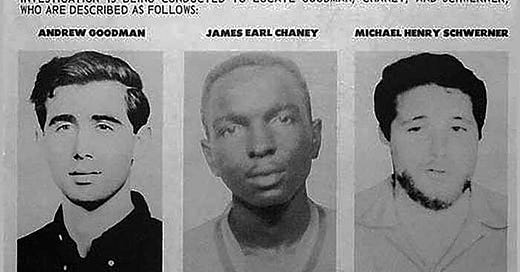These Are the Stakes
Representative democracy is fragile and under extreme threat. Its survival rests in our hands.
A modest roadside marker stands along a wooded stretch of Highway 19 south of Philadelphia, Mississippi.
Here, on a June night 60 years ago, James Chaney, Andrew Goodman, and Michael Schwerner were shot at close range and buried in a shallow grave, brutally murdered for acting on their belief that every voice mattered in the Deep South.
The three men were activists working with the Freedom Summer campaign and had returned to the state that day to investigate the burning of a Black church—the same one where Chaney and Schwerner had previously set up a voting registration drive.
Eight hundred miles and a century removed from Robert E. Lee’s surrender at Appomattox, these men were among the final casualties of the Civil War. Although their killers didn’t wear gray uniforms under the Confederate flag, they subscribed to the same abhorrent ideology. Decades would pass before the Klansman who orchestrated the slayings faced justice.
Outrage over the activists’ deaths fueled the passage of the Voting Rights Act of 1965, designed to enforce the suffrage enshrined in the Fourteenth and Fifteenth Amendments—the amendments that stood as the crowning achievements of Reconstruction until they were left to rot in the face of resurgent white rule in the South.
In their insistence that America fulfill its promise, Chaney, Goodman, and Schwerner gave, in Lincoln's words, the last full measure of devotion. They died as heroes to the cause of equality under the law, no less than Grant, Douglass, or Tubman. Their memory serves as a reminder that the forces arrayed against representative democracy lurk in the shadows, waiting for any lapse in vigilance.
Today, we confront new and insidious agents of chaos and division, yet their aim remains clear: to disrupt and sow doubt in free and fair elections. For years, Republicans have chipped away at the core protections in the Voting Rights Act. Donald Trump spent the final months of his presidency making claims of widespread voter fraud, pursuing dubious legal challenges, and pressuring state officials to overturn election results. When all else failed, he incited a violent mob to storm the U.S. Capitol. If sedition isn’t disqualifying, I don’t know what is.
Now, in the final hours of this fraught campaign, we face a choice that transcends all else. We are tasked with rejecting a man and a movement that actively undermines the integrity of our democratic process. Trump threatens election workers, casts doubt on ballots yet to be counted, and promotes election deniers for key positions of power. He has said that he’ll only accept the results if he wins.
Our democracy is as fragile now as it has been in decades. Its survival demands that we summon but an ounce of the conviction that three young men displayed on a fateful summer day in Mississippi. - MS


